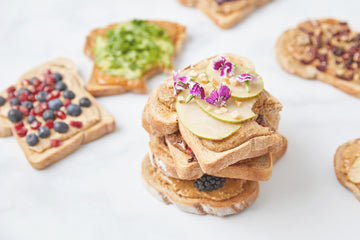
You don't need a silver fork to eat good food. - Paul Prudhomme
Our friends at the Good Food Foundation (formerly Seedling Projects) and the Good Food Retailers Collaborative have organized what we consider the best series of gatherings of food producers in the country - the Good Food Mercantile, an “un-trade show for tasty, authentic, responsible food.” We were honored to participate in the first Mercantile in San Francisco in early 2015, and we’ve since been able to participate in others located in Chicago and Brooklyn.
Unlike most “trade” shows, the Mercantiles actually encourage quality and integrity, limiting participation to 125 food producers who have placed in the Good Food Awards or passed the sustainability vetting process to belong to the Good Food Guild, of which we are a proud member. The single-day, intimate gatherings of like-minded food crafters and retailers offer equal-sized booths to everyone, a start time conducive to arriving well rested, and booth fees at a fraction of the price of typical food trade shows. In other words, the goals of the Good Food Mercantile are aligned with helping small businesses like ours build community and grow sustainably.
Most recently, we participated in the Good Food Mercantile NY at the Brooklyn Expo Center in Williamsburg. It was a wonderful opportunity to not only spend time with friends and peers from the world of handmade food, it was also a perfect opportunity connect with current customers we rarely see in person and meet new potential retail partners.
Here's my answer:
In many ways, Big Spoon Roasters is a reaction to trends of over-industrialization, homogenization, and commodification that have occurred in commercial food production over the last century. When businesses primarily focus on reducing costs, growth for the sake of growth, increasing consumer convenience and shareholder earnings; quality (flavor, freshness), sustainability, and ingredient / raw material integrity tend to suffer. This is not just true for food.
Not to get too "out there," but we humans are very often too smart for our own good. We overthink things. We are organisms in an ecosystem, and we need to eat to survive. After personal relationships (with other humans and our beloved animals), food represents our most intimate relationship with the world we live in; food literally becomes us when we eat it. Food connects us to each other socially, culturally, and historically. Sure, food is technically fuel, but it's so much more than that; it is used to welcome guests, celebrate, bond with strangers, and to experience the pure pleasure of living. Our relationship with food should be built upon health, vibrancy, and biodiversity.
The dominant profit-centered, monocrop, chemical-intensive agriculture we have been practicing for decades is eroding our soils, killing ecosystems, destroying biodiversity, and making "WOW" taste experiences increasingly rare. Furthermore, the exponential increase in the production and consumption of processed, nutritionally empty foods has lead to epidemics of obesity, diabetes, heart disease, and other deadly metabolic disorders. If we feel any responsibility for the future health and happiness of our planet and forthcoming generations (and we should), we need to radically change the way that we feed ourselves.
We know that the idyllic "everyone is a small organic farmer who makes their own pantry goods" isn't realistic, so businesses like ours exist to help provide people with the best possible versions of pantry goods that people might not have time or the resources to make for themselves. We are a tiny nut butter business, and the decisions we make have a small fraction of the significance of those made by much larger brands, but if we stay true to our values, we know that every decision, no matter how small, has a positive effect on the people that enjoy our nut butters, their communities, and ours. Good food, for me, might mean a single raw delicious heirloom apple, grown without the use of toxic pesticides and, if picked by a farm worker, picked by someone who was paid and treated fairly. It might be a slice of Olympia Provisions salami or a hunk of Uplands Cheese Company cheese, both made with love and craft and from animals that lived happy lives free of fear or suffering.
Good food doesn't compromise quality for convenience. Good food isn't born from suffering. Good food is transparent. Good food is nutritious and makes you feel good, physically and emotionally, when you eat it. Good food rewards everyone involved in producing it. What does good food mean to you?


